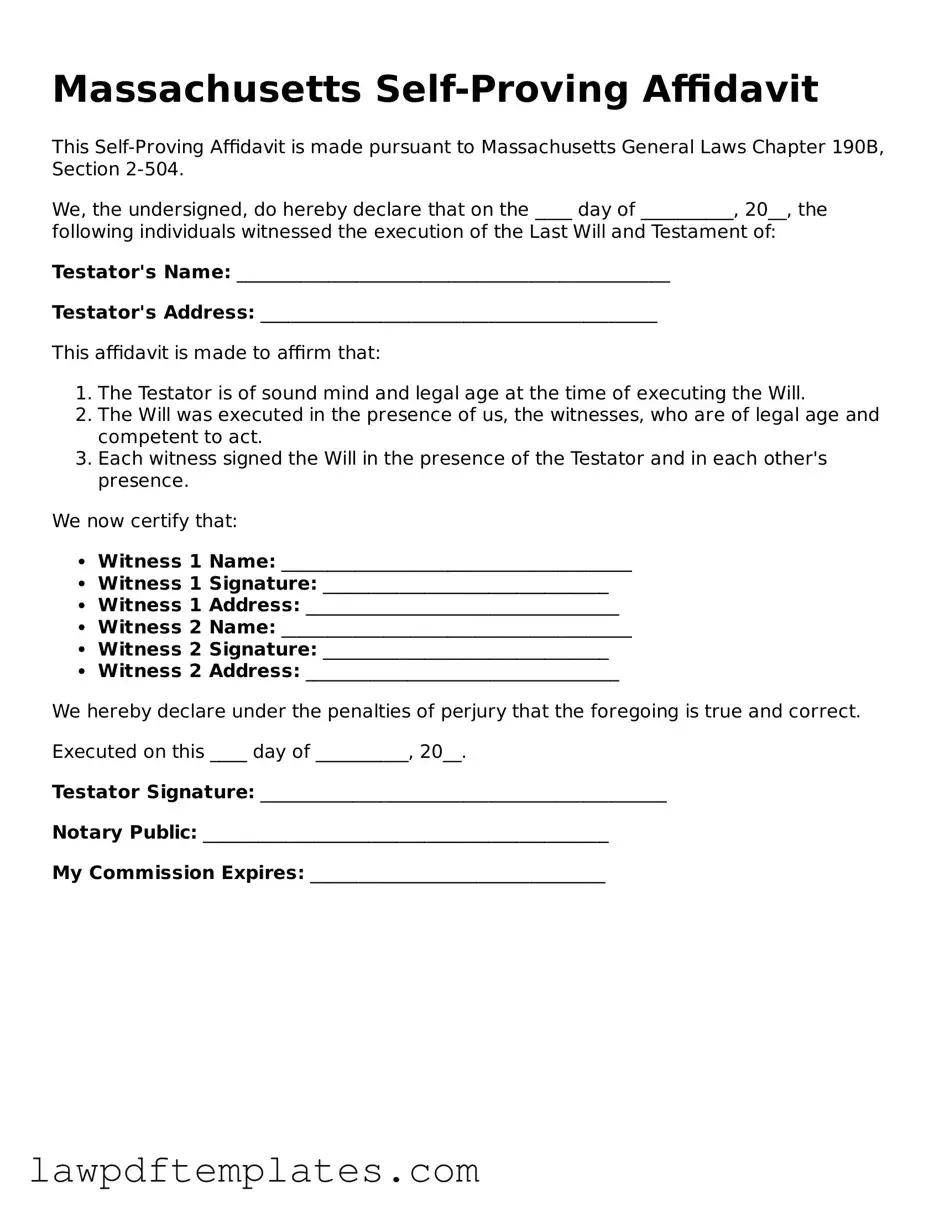Free Self-Proving Affidavit Template for the State of Massachusetts
Form Breakdown
| Fact Name | Description |
|---|---|
| Purpose | The Massachusetts Self-Proving Affidavit allows a will to be validated without requiring witnesses to appear in court. |
| Governing Law | This affidavit is governed by Massachusetts General Laws, Chapter 190B, Section 2-504. |
| Who Can Use It | Any individual creating a will in Massachusetts can use the Self-Proving Affidavit. |
| Signature Requirement | The testator and witnesses must sign the affidavit in the presence of each other. |
| Notarization | A notary public must acknowledge the signatures on the affidavit. |
| Form Availability | The Self-Proving Affidavit form can be found online or through legal document providers. |
| Legal Effect | This affidavit helps streamline the probate process by eliminating the need for witness testimony. |
| Validity | The affidavit remains valid as long as it is executed according to state laws. |
| Revocation | A Self-Proving Affidavit can be revoked if the will is revoked or amended. |
| Additional Information | Consulting an attorney for specific guidance on using the affidavit is advisable. |
Sample - Massachusetts Self-Proving Affidavit Form
Massachusetts Self-Proving Affidavit
This Self-Proving Affidavit is made pursuant to Massachusetts General Laws Chapter 190B, Section 2-504.
We, the undersigned, do hereby declare that on the ____ day of __________, 20__, the following individuals witnessed the execution of the Last Will and Testament of:
Testator's Name: _______________________________________________
Testator's Address: ___________________________________________
This affidavit is made to affirm that:
- The Testator is of sound mind and legal age at the time of executing the Will.
- The Will was executed in the presence of us, the witnesses, who are of legal age and competent to act.
- Each witness signed the Will in the presence of the Testator and in each other's presence.
We now certify that:
- Witness 1 Name: ______________________________________
- Witness 1 Signature: _______________________________
- Witness 1 Address: __________________________________
- Witness 2 Name: ______________________________________
- Witness 2 Signature: _______________________________
- Witness 2 Address: __________________________________
We hereby declare under the penalties of perjury that the foregoing is true and correct.
Executed on this ____ day of __________, 20__.
Testator Signature: ____________________________________________
Notary Public: ____________________________________________
My Commission Expires: ________________________________
Common mistakes
Filling out the Massachusetts Self-Proving Affidavit form can be a straightforward process, but several common mistakes can lead to complications. One frequent error is failing to ensure that all required signatures are present. The affidavit requires the signatures of both the testator and the witnesses. Omitting even one signature can render the document invalid.
Another mistake involves incorrect dates. It’s crucial to provide the correct date when the affidavit is signed. If the date is missing or incorrect, it can create confusion about when the will was executed, potentially leading to disputes later on.
People often overlook the need for clarity in the printed names of the testator and witnesses. Using initials or unclear handwriting can cause problems. Full names should be printed clearly to avoid any ambiguity regarding who has signed the document.
Additionally, many individuals forget to include the statement of the witnesses. The affidavit must contain a declaration that the witnesses were present at the same time when the testator signed the will. Neglecting this statement can lead to challenges in proving the will’s validity.
Another common issue is not following the specific formatting requirements. The Massachusetts Self-Proving Affidavit has a designated structure. Deviating from this format can lead to rejection by the probate court.
Some people also fail to have the affidavit notarized. While not all affidavits require notarization, the Massachusetts Self-Proving Affidavit does. Without a notary’s signature, the affidavit may not be accepted as valid.
Lastly, individuals sometimes misinterpret the purpose of the affidavit. It serves to simplify the probate process by affirming the validity of the will, not to replace the will itself. Understanding this distinction is vital to ensure that the affidavit serves its intended function.
Discover More Self-Proving Affidavit Templates for Specific States
Self-proving Affidavit - It provides a straightforward way to prove the will's legitimacy after the testator has passed away.
Free Florida Affidavit Template - This affidavit enhances the credibility of the will by officially documenting its signing.
For those looking to efficiently complete the Texas Employment Verification form, resources are available that can help guide the process. By visiting https://texasformspdf.com/fillable-texas-employment-verification-online, employers can access the necessary tools to ensure that all information provided meets the standards required by the Texas Health and Human Services Commission, thereby facilitating a smoother verification experience.
How to Make Affidavit - This affidavit reflects legal principles, making it a valuable tool for estate matters.
